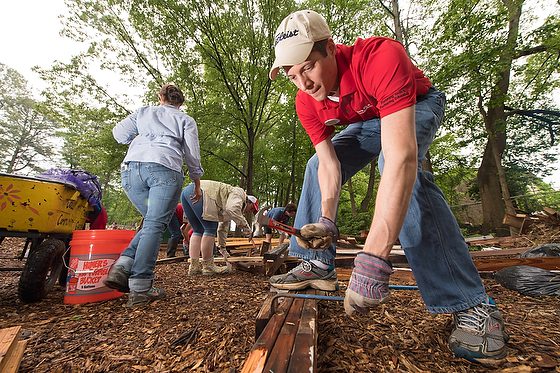| Nikon D5, AF-S NIKKOR 14-24mm f/2.8G ED, ISO 400, ƒ/8, 1/100–Neewer TT850, Neewer 433MHz Wireless 16 Channel transmitter [Exposure Bias: -4/6 EV] |
This morning I was shooting volunteers pulling nails out of 2’x4’s. We started early morning because it was sprinkling and a downpour was coming. Meteorologists were predicting a stormy overcast day.
When people bend over and have on ball caps, this is the worst possible situation I can think of shooting where the natural light is working against you.
This morning I avoided getting this type of photo that I had at a football game. See how you cannot see the people’s faces. The light is from above, and when they are facing down, you have total black under those helmets, just like you have under the visor of a baseball cap.
My assistant took one of the Neewer TT850 flashes, and I had the transmitter that controls my camera’s power. Sometimes I was at 1/8 power and other times only needed about 1/64 power to fill in those shadows of the people working.
My camera is on the ground so that I can see their faces, and so is the flash. I asked the assistant to try and stay 45º to 90º from me to create a triangle. I am one corner, the subject is another, and the flash is the 3rd corner of the triangle.
I am also slightly under-exposing from 1/3 to 2/3 and even up to -1. The flash is kicking in and becomes the leading light on the faces.
 |
| Nikon D5, AF-S NIKKOR 14-24mm f/2.8G ED, ISO 180, ƒ/8, 1/100–Neewer TT850, Neewer 433MHz Wireless 16 Channel transmitter [Exposure Bias: -4/6 EV] |
Had I used an on-camera flash, I would have gotten much better results than without a flash, but by getting the flash off the camera, I created more skin modeling and depth.
Just remember always to have a flash in case you need to do something similar to help the audience connect with the subject.



